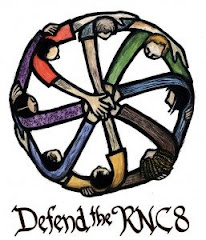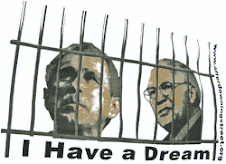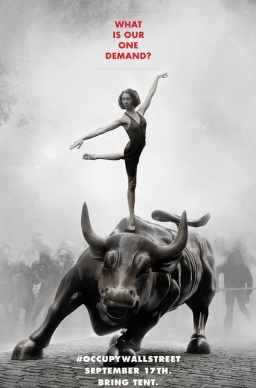A segment of Picasso's famous painting, Guernica


http://www.robertsilvey.com/photos/uncategorized/fallujah1.jpg
This April marks the third anniversay of the first of two American-led military assaults culminating in the massive destruction of most of the ancient Iraqi city of Fallujah. Consequently, I am republishing my account of this event here on Mosquito Blog, lest we forget. It was first published by the Southern I in print form, and later at OpEdNews.com, the web-link to which site you can access by clicking on this article's title above. Here is Part 2.
Fallujah, the Guernica of Our TimesPart 2: The Destruction Begins
By Mac McKinney"Violence will prevail over violence, only when someone can prove to me that darkness can be dispelled by darkness." - Mahatma Gandhi
*****The slaying of the four Blackwater contractors, whom some would call soldiers of fortune, for they were well-trained weapons experts, one an ex-Navy Seal, the others former Army Rangers, and certainly not simple construction or relief workers, did not play well back in the States. The corporate media became obsessed with their grizzly deaths, and newspaper editorials raged over the manner of their deaths. Comparisons with the traumatic incident in Mogadishu, Somalia in 1993, when slain GIs were dragged through the streets, further enflamed emotions and rhetoric. What was rapidly becoming lost in the corporate media and public responses was any in-depth, impartial analysis of the event or the background in Fallujah. Little mention was made that a number of the city's civilians had been slain by American forces or that the Army had been engaging in hostile and aggressive street patrols for months, often employing violent, destructive entries into homes that resulted in the arrests and imprisonment of Fallujah's citizens, including prominent ones. That tensions between Americans and citizens were very high is painstakingly obvious. That many Fallujans felt humiliated, angry or vengeful further belabors the point. That this growing list of grievances compelled some citizens to join some facet of the now multi-dimensional Iraqi insurgency is not a giant leap in logic. However, official American pronouncements and communiqués basically denied the legitimacy of these grievances, constantly referring to those taking up arms as Baathists, terrorists and "other malcontents." I suppose British officers said something similar about American rebels some 230 years ago.
So now the clichéd image of Fallujah as a lawless hotbed of insurgent violence somehow unrelated to an increasingly brutal occupation began to dominate the news. The "they" of the original mob action of some one thousand plus people easily segued into a wider "they", i.e. the people of Fallujah in general. Remembering that over three hundred thousand people inhabited Fallujah at the time, this was a dangerous segue indeed. If a mob of a thousand people rioted in downtown Norfolk over some incident, would the media be so quick to say that the "people" of Norfolk had rioted, that Norfolk was a lawless and violent city, or furthermore that the city should be brought to heel? We must remember, furthermore, that the American Army had been in official control of Fallujah for months supposedly pacifying the population, before pulling out in the last few weeks. If Fallujah was now deemed anarchistic, what does that say about the character of the Army's administration for the past year? Had the Army been unable to contain a chaotic situation, or had their presence actually created or aggravated the situation?
Fallujah CalmIronically, Fallujah, upon Saddam Hussein's overthrow, was decidedly more peaceful than many other parts of Iraq before American troops arrived in April of 2003. Human Rights Watch, in a report on Fallujah dated June, 2003, (Violent Response: the US army in al-Falluja) describes how tribal and religious leaders had created a Civil Management Council to maintain order against the widespread looting and vicarious destruction that was sweeping through the rest of Iraq at the time. The Council, acting through the tribes and Sunni imams, was largely successful. Tribal fealty and respect were powerful in Fallujah. Recall that Fallujah was nicknamed the City of Mosques, denoting a strong religious foundation, and had had a storied history as a Jewish academic center in the Middle Ages, for Islam generally accepted the Jews culturally for generations. It was now a modern, teeming, industrial city, not some primitive, backwater junction. And when the US Army first entered Fallujah, the tribes even elected a staunchly pro-American mayor, Taha Bidaywi Hamed, to negotiate with them.
Nor was the city the purely Baathist, pro-Saddam citadel often alleged in the corporate media. Although that element was indeed strong, the above-mentioned report states that: "Human Rights Watch did not find overwhelming sympathy for Saddam Hussein following the collapse of his government. Many al-Falluja residents told Human Rights Watch that they considered themselves victims and opponents of his repressive rule." This is, perhaps, not surprising, given that the city is famous for its spirit of rebellion. Indeed, Fallujah is best known in the minds of Iraqis as the symbol of resistance against the early 20th Century Imperial British occupation of their land.
Lawrence of Arabia Speaks OutAt the end of World War I the British, cynically carving up the defeated Ottoman Empire with their gleeful French allies, took control of what became the state of Iraq. By early 1920, however, the British government found itself facing a growing revolt there. T.E. Lawrence, more famously known as Lawrence of Arabia, had himself warned England not to attempt heavy-handed Imperialist designs against the independence aspirations of the Arabs, whom Lawrence had fought alongside and grown to respect as valiant, proud and determined guerrilla fighters, a people not to be taken lightly or treated disrespectfully. The British, however, threw caution to the wind and dispatched the famous English explorer, Lt. Col. Gerard Leachman, to stop a local rebellion in Fallujah. Leachman, however, was slain just south of the city in a confrontation with the local tribal leader, Shaykh Dhari. Vengeful, the British ordered the Imperial Army and Royal Air Force to crush the rebellion, and the ensuing assault on Fallujah cost more than 10,000 Iraqi and 1,000 British lives. Although Fallujah was bloodied and battered, even more widespread rebellion by both Iraqi Sunnis and Shiites now ensued. By August of 1920, Lawrence would write disgustedly:
"The people of England have been led in Mesopotamia into a trap from which it will be hard to escape with dignity and honour. They have been tricked into it by a steady withholding of information. The Baghdad communiques are belated, insincere, incomplete. Things have been far worse than we have been told, our administration more bloody and inefficient than the public knows. It is a disgrace to our imperial record, and may soon be too inflamed for any ordinary cure. We are today not far from a disaster."
"......We say we are in Mesopotamia to develop it for the benefit of the world. All experts say that the labour supply is the ruling factor in its development. How far will the killing of ten thousand villagers and townspeople this summer hinder the production of wheat, cotton, and oil? How long will we permit millions of pounds, thousands of Imperial troops, and tens of thousands of Arabs to be sacrificed on behalf of colonial administration which can benefit nobody but its administrators?" (Sunday Times, August 2, 1920)
This decades-old missive to the London Times could just as well be written today and be equally as timely and truthful, if not more so. The growing rebellion was ultimately only defused in 1922 through the strenuous efforts of a young Winston Churchill, who personally enlisted Lawrence's considerable aid in resolving the conflict.
This, then, was the legacy of Fallujah when American-led coalition forces invaded Iraq, proclaiming themselves as liberators but soon acting, fundamentally, as occupiers usually act, that is, arrogantly and brutally, not unlike the British in 1920. Is it surprising that many Fallujans now felt an obligation to renew this legacy against the latest army of occupation? And you certainly didn't have to be a Baathist to feel this way. Let us reflect a moment. If a hypothetical British army were to occupy Massachusetts today, imposing martial law, ransacking houses and shooting, beating and incarcerating citizens, would not the inhabitants of Boston feel the heritage of their own revolutionary ancestors weighing upon them in a similar vein?
Operation Vigilant Resolve BeginsAn order of battle was now being drawn up by military headquarters in Iraq. That American authorities were about to retaliate against Fallujah for the Blackwater contractor slayings became increasingly obvious to the world and to the inhabitants of Fallujah. It must be noted that a number of citizens both in Fallujah and throughout Iraq were combat veterans of the long and bloody Iran-Iraq war that ended in 1988 with a pyrrhic Iraqi victory, and that some of these veterans were now helping to organize a hasty defense of Fallujah, and they may not have necessarily considered themselves members of any insurgent or guerrilla faction, but simply defenders of their city.
On April 2, 2004 Army Brigadier General Mark Kimmit removed any lingering doubts about US intentions by vowing to hunt down the killers and retake Fallujah. The American-managed Coalition Provisional Authority's Iraqi Governing Council seconded these sentiments and authorized the Iraqi National Guard to participate. The 1st Marine Expeditionary Force moved into various positions to begin a massive operation, not only in Fallujah, but throughout Anbar Province, part of the Sunni Triangle, to strike broadly at the insurgency.
According to GlobalSecurity.org, on or around April 4, 2004, Operation Vigilant Resolve was launched, originally publicized as a combined US Marine-Iraqi National Guard operation, but the recently created Iraqi units had little stomach for combat. Most, if not all, deserted, some declaring that they did not sign up to fight fellow Iraqis. So this became, essentially, a Marine Corps operation, combining infantry and armored divisions, artillery, and Marine and Navy air support. The Marines had at their disposal Navy F/A-18 Hornet carrier-based Fighter-Bombers equipped with 20-mm cannon for strafing and 500-pound GBU-12 laser guided bombs, as well as lethal AC-130 "Spectre" gunships, F-15 Fighters and Cobra Attack Helicopters.
(http://www.globalsecurity.org/military/ops/oif-vigilant-resolve.htm)
The huge AC-130 gunship is fitted with a battery of Gatling guns and cannons capable of saturating an entire football field with heavy fire in mere seconds, and incorporates an ultra high-tech fire control and night vision system second to none in the world. An earlier model was first employed in the Vietnam War with devastating effect and was nicknamed, with blackest humor, "Puff, the Magic Dragon", the title of a popular children's song by Peter, Paul and Mary.
On the ground, the Marines sealed off and cordoned Fallujah into four quadrants and began to cautiously enter the city, their stated intention, in particular, to arrest the perpetrators of the Blackwater slayings and other attacks, if that was even remotely feasible, and in general, to engage and neutralize active enemies of American forces and the Coalition-created Iraqi government.
As the Marines slowly plodded ahead, explosions and gunfire could be heard on Monday, April 5, as skirmishes between the Marines and random Fallujan gunmen began to break out. Monday's attacks could well be considered probing actions by both sides. On Tuesday, things began to intensify dramatically as the Marines drove toward the center of the city, drawing increasingly heavy hostile fire. The Marines soon realized that they were facing an enemy experienced in Russian-style defense-in-depth tactics, most likely led by army veterans from the Iran-Iraq war. The Marines' advance now morphed into a fierce battle against guerrillas holed up in a residential neighborhood and laying down fire that included mortars and RPGs (Rocker Propelled Grenades), a firefight that lasted for hours, causing exasperated commanders to call in an AC-130 "Spectre" that duly sprayed Iraqi positions with a hailstorm of bullets. How many insurgents or hapless residents were caught in this deadly fusillade is not really known, but the fact that the command was even willing to deploy the AC-130 over a residential neighborhood would serve as a grim omen for the city.
Casualties were now beginning to mount on all sides, including among non-combatants. The hospitals in Fallujah were starting to see a steady stream of the wounded and dying. As night fell, the Marines pulled back from their forward-most positions and called in air strikes, American warplanes, according to a Fox News report, firing rockets that destroyed four houses, with a doctor claiming, the report continues, that 26 men, women and children were slain in this attack, another 30 wounded. Throughout the night in various parts of the city, Marine squads weaved in and out of buildings, engaging guerrillas sporadically and trying to stake out posts, while the heavy whirl of rotary blades could be heard overhead as Marine helicopters circled, hovered or darted about above the rooftops, laying down intermittent fire against perceived enemy positions.
As the night wore on and the first rays of sunlight began to illuminate the horizon, violence, which had yet to reach its apex in the City Of Mosques, was also beginning to erupt throughout Iraq, as if Fallujah had been but the fuse to ignite an even larger powder keg.
(Combat source: http://www.foxnews.com/story/0,2933,116262,00.html)
Next article, Part 3:
Protests Amid the Onslaught

















